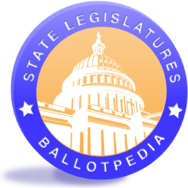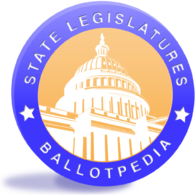2018 Rhode Island legislative session
 |
| 2018 legislative sessions coverage |
|---|
| Rhode Island General Assembly | |
 | |
| General information | |
| Type: | State legislature |
| Term limits: | None |
| Session start: | January 2, 2018 |
| Session end: | June 25, 2018 |
| Website: | Official Legislature Page |
| Leadership | |
| Senate President: | Dominick Ruggerio (D |
| House Speaker: | Nicholas Mattiello (D) |
| Majority Leader: | Senate: Michael McCaffrey (D) House: K. Joseph Shekarchi (D) |
| Minority Leader: | Senate: Dennis Algiere (R) House: Patricia Morgan (R) |
| Structure | |
| Members: | 38 (Senate), 75 (House) |
| Length of term: | 2 years (Senate), 2 years (House) |
| Authority: | Art VI, Section 2, Rhode Island Constitution |
| Salary: | $15,414/year |
| Elections | |
| Redistricting: | Rhode Island Legislature has control |
During 2018, Ballotpedia tracked notable stories from the Rhode Island General Assembly. The timeline on this page shows the major events that we tracked during 2018, including events in the regular session and in any special sessions that occurred after the regular session adjourned.
If you know of any additional events that should be added to this page, please email us at editor@ballotpedia.org.
Overview
In 2018, the Rhode Island General Assembly was in session from January 2, 2018, through June 25, 2018.
Partisan control
Rhode Island was one of eight Democratic state government trifectas in 2018. A state government trifecta occurs when one political party holds the governor's office, a majority in the state Senate, and a majority in the state House. For more information about state government trifectas, click here.
The following tables show the partisan breakdown of the Rhode Island General Assembly in the 2018 legislative session.
Senate
| Party | As of July 2018 | |
|---|---|---|
| Democratic Party | 33 | |
| Republican Party | 4 | |
| Vacancies | 1 | |
| Total | 38 | |
House
| Party | As of July 2018 | |
|---|---|---|
| Democratic Party | 64 | |
| Republican Party | 11 | |
| Independent | 0 | |
| Vacancies | 0 | |
| Total | 75 | |
Leadership in 2018
Senate
- Senate president: Dominick Ruggerio (D)
- Majority leader: Michael McCaffrey (D)
- Minority leader: Dennis Algiere (R)
House
- Speaker of the House: Nicholas Mattiello (D)
- Majority leader: K. Joseph Shekarchi (D)
- Minority leader: Patricia Morgan (R)
Regular session
Status of legislation at the end of the regular session
This table details the status of legislation covered on this page at the end of the regular session.
| Status of legislation at the end of the 2018 regular session | |||
|---|---|---|---|
| Legislation | Subject area | Actions during the regular session | Status at the end of the regular session |
| S 2292 Substitute A | Bump stock ban | Passed Senate Passed House |
Governor signed |
| S 2492 Substitute A | Extreme risk protection order | Passed Senate Passed House |
Governor signed |
| H 7200 Substitute A | Budget | Passed General Assembly | Governor signed |
May 24, 2018
State Senate approves firearm-related legislation
The Rhode Island State Senate passed a bill to ban bump stocks in a 33-1 vote. The bump stock, which allows semi-automatic firearms to fire similarly to automatic weapons, was linked with the October 2017 mass shooting in Las Vegas.
The Senate also approved by a 33-1 vote a bill allowing judges to suspend an individual's access to firearms if the judge found that the individual posed a threat to him- or herself and/or to others.[1]
- Update: The Rhode Island General Assembly passed the bills on May 31, 2018. Gov. Gina Raimondo (D) signed them on June 1, 2018.
- See also: Extreme risk protection orders in state legislatures
May 31, 2018
Rhode Island General Assembly sends firearm-related legislation to governor's desk
The Rhode Island General Assembly sent to two firearm-related bills (SB 2922 and SB 2492) to Gov. Gina Raimondo's (D) desk. Raimondo expressed support for the bills.
SB 2922 would prohibit the possession or use of bump stocks or similar devices, punishable by up to 10 years in prison and/or a fine of $10,000. SB 2492 would authorize judges to issue extreme risk protection orders, which result in the confiscation of firearms from individuals deemed by the court to pose a threat to themselves or others.
According to the Providence Journal, eight other states had extreme risk protection order laws at the time of the bills' passage: California, Maryland, Oregon, Washington, Connecticut, Florida, Indiana, and Vermont.[2] Similar legislation was also under consideration in Illinois. Read more here.
- Update: Gov. Gina Raimondo (D) signed the bills on June 1, 2018.
- See also: Extreme risk protection orders in state legislatures
June 1, 2018
Gov. Raimondo signs extreme risk protection order legislation
Gov. Gina Raimondo (D) signed SB 2492. A statement from the governor's office described the legislation as allowing "law enforcement to petition the courts to remove firearms from individuals who pose a significant danger of causing imminent personal injury to themselves or others."[3] The bill had the support of the Rhode Island Police Chiefs Association.[4] It was passed following a school shooting on February 14, 2018, at Marjory Stoneman Douglas High School in Parkland, Florida, which left 17 people dead. Gov. Raimondo issued an executive order on February 26, 2018, that said law enforcement should "take all available legal steps" to remove firearms from a person deemed a significant threat and refer them for appropriate medical or mental health treatment.
Budget
2018
Gov. Gina Raimondo (D) signed a $9.6 billion budget bill on June 22, 2018. The state House approved the bill 66-7 on June 15, 2018, and it passed the state Senate 34-2 five days later.[5][6]
The bill increased funding by $300 million over fiscal year 2018 levels. The legislation:
- Authorized a five-year plan to implement sports betting—operated by IGT, a gaming company—at two casinos owned by Twin River. The state would collect 51 percent of revenue, IGT would receive 32 percent, and Twin River 17 percent. The provision was projected to raise $23.5 million in fiscal year 2019.
- Approved a ballot measure asking voters to approve $367.3 million in bonds. About $250 million would finance the first phase of a $1 billion school reconstruction plan, $70 million would go towards higher education initiatives at the University of Rhode Island and Rhode Island College, and $47.3 million would go toward environment, recreation, and water infrastructure projects.
- Increased tax credits given to motion picture production companies from 25 percent to 30 percent of production costs. It also raised the cap on credit from $5 million to $7 million.
- Raised the fee for medical marijuana licenses from $5,000 to $250,000.
- Increased Medicaid payments to 59 nursing homes by 2.5 percent in exchange for dropping a lawsuit against the state. Lawmakers estimated the increase would cost $9 million.[7][8][9]
Process
- See also: Rhode Island state budget and finances
| Rhode Island on |
The state operates on an annual budget cycle. The sequence of key events in the budget process is as follows:[10]
- Budget instructions are sent to state agencies in July of the year preceding the start of the new fiscal year.
- Agencies submit their budget requests to the governor by October 1.
- Agency hearings are held in November and December.
- The governor submits his or her proposed budget to the state legislature in January. A newly elected governor has until the first Thursday in February.
- The legislature typically adopts a budget in June. The fiscal year begins July 1.
In Rhode Island, the governor has no veto authority over the budget.[10]
The governor is constitutionally required to submit a balanced budget proposal. Likewise, the legislature is required to pass a balanced budget.[10]
Legislatively referred constitutional amendments
In every state but Delaware, voter approval is required to enact a constitutional amendment. In each state, the legislature has a process for referring constitutional amendments before voters. In 18 states, initiated constitutional amendments can be put on the ballot through a signature petition drive. There are also many other types of statewide measures.
The methods in which the Rhode Island Constitution can be amended:
There are two paths by which the Rhode Island Constitution can be changed: the legislatively referred constitutional amendment and the constitutional convention. Rhode Island residents do not have the power of initiated constitutional amendments.
Legislature
A simple majority vote is required during one legislative session for the Rhode Island State Legislature to place a constitutional amendment on the ballot. That amounts to a minimum of 20 votes in the Rhode Island House of Representatives and 38 votes in the Rhode Island State Senate, assuming no vacancies. Amendments do not require the governor's signature to be referred to the ballot.
Convention
According to section 2 of Article XIV of the Rhode Island Constitution, a simple majority vote in one legislative session is required for the state legislature to place a constitutional convention question on the ballot. A simple majority vote of the electorate is required to call the convention. The state constitution also requires that a state constitutional convention question is provided to voters at least 10 years after the prior question. Rhode Island is one of 14 states that provides for an automatic constitutional convention question.
The table below shows the last and next constitutional convention question election years:
| State | Interval | Last question on the ballot | Next question on the ballot |
|---|---|---|---|
| Rhode Island | 10 years | 2014 | 2024 |
2019 measures:
- See also: 2019 ballot measures
Certified:
- The following measures were certified for the ballot.
No measures to list
2018 measures:
Below is a list of measures that were referred to the 2018 ballot by the legislature.
- See also: Rhode Island 2018 ballot measures
Certified:
- The following measures were certified for the ballot.
See also
| Elections | Rhode Island State Government | State Legislatures | State Politics |
|---|---|---|---|
 |
 |
 |
 |
External links
Footnotes
- ↑ Providence Journal, "R.I. Senate overwhelmingly OKs red-flag law, bump stock ban," May 24, 2018
- ↑ Providence Journal, "R.I. General Assembly passes ‘red-flag’ legislation on guns," May 31, 2018
- ↑ RI.gov, "Raimondo Signs Gun Safety Legislation to Protect Rhode Islanders," June 1, 2018
- ↑ WPRI.com, "Raimondo signs 'red flag' bill, bump stock ban into law," June 1, 2018
- ↑ RI.gov, "Governor Raimondo highlights Rhode Islanders as she signs FY19 budget," June 22, 2018
- ↑ WPRO, "Raimondo to sign $9.6 billion state budget," June 21, 2018
- ↑ The Sacramento Bee, "Rhode Island House OKs $9.5B budget, approves sports betting," June 15, 2018
- ↑ Idaho Statesman, "The Latest: Lawmakers approve plan for sports betting," June 15, 2018
- ↑ TurnTo10, "Senate votes to send $9.6B state budget to governor's desk," June 20, 2018
- ↑ 10.0 10.1 10.2 National Association of State Budget Officers, "Budget Processes in the States, Spring 2021," accessed January 24, 2023
| |||||||||||
